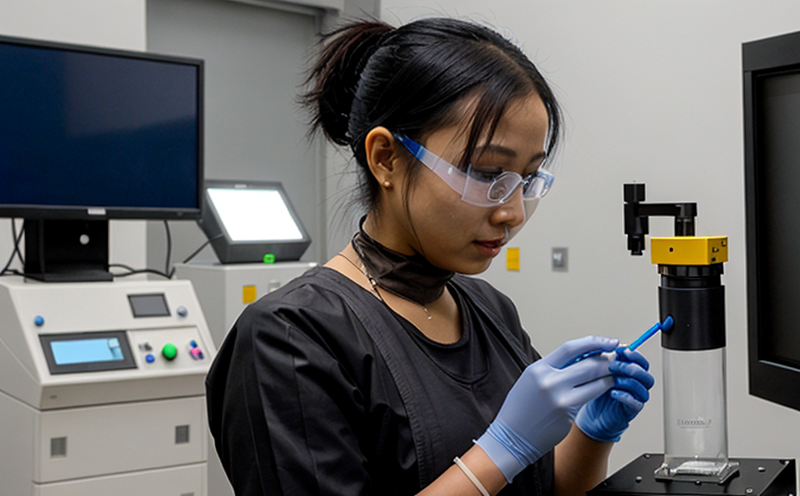OECD TG 305 Bioaccumulation Testing of Nanoparticles in Aquatic Species
The OECD Test Guideline (TG) 305 provides a standardized approach to assessing the potential for aquatic organisms to accumulate nanoparticles, which is critical for understanding environmental risk. This test specifically evaluates the bioaccumulation of nanomaterials by freshwater and marine fish species over 21 days. The primary goal is to determine if these particles can be taken up into the tissues of the organism, thereby posing a risk to aquatic ecosystems.
The OECD TG 305 protocol involves several key steps that ensure accurate assessment of nanoparticle bioaccumulation:
- Experimental Design: The test is conducted in triplicate to account for variability and ensure robust data. Aquatic organisms are exposed to a range of concentrations of the nanomaterial under controlled environmental conditions.
- Specimen Preparation: Freshwater species like zebrafish or marine fish such as flounder are used, with specific attention paid to their physiological responses to nanoparticles.
- Instrumentation and Monitoring: High-resolution imaging techniques and advanced analytical instruments are employed to track nanoparticle uptake. This includes the use of scanning electron microscopy (SEM) for detailed visualization of particle distribution within tissues.
- Sample Collection and Analysis: Samples are collected at specific intervals throughout the 21-day exposure period, allowing for a comprehensive analysis of bioaccumulation trends.
The OECD TG 305 is particularly relevant in sectors like pharmaceuticals, cosmetics, and nanotechnology, where the development and use of novel materials can have significant environmental implications. The test ensures that any new or existing products are assessed comprehensively for their potential ecological impact.
Accurate bioaccumulation testing is essential because nanoparticles can behave differently compared to larger particles due to their increased surface area-to-volume ratio. This characteristic enhances their reactivity and interaction with biological systems, making it crucial to understand how they accumulate in aquatic environments.
The OECD TG 305 protocol is designed to be rigorous yet flexible, allowing for adjustments based on the specific characteristics of the nanomaterial under study. Compliance with this guideline helps ensure that results are comparable across different studies and laboratories, thereby enhancing confidence in regulatory decisions.
Eurolab Advantages
Eurolab offers unparalleled expertise in conducting OECD TG 305 bioaccumulation testing of nanoparticles. Our team comprises seasoned professionals with extensive experience in nanomaterials research and environmental toxicology. Here are some key advantages:
- State-of-the-Art Facilities: Equipped with cutting-edge laboratories, including advanced imaging technologies like SEM and ICP-MS (Inductively Coupled Plasma Mass Spectrometry), we provide precise measurements.
- Comprehensive Data Analysis: Our scientists use sophisticated software tools to interpret complex data sets, ensuring accurate identification of bioaccumulation trends.
- Regulatory Compliance: Eurolab adheres strictly to OECD guidelines and other relevant international standards, guaranteeing that our findings are acceptable for regulatory bodies worldwide.
- Dedicated Client Support: Our team is committed to providing clients with detailed reports and insights throughout the testing process, ensuring a transparent and supportive experience.
- Research Collaboration: We actively participate in collaborative research projects that contribute to advancing knowledge about nanomaterials and their environmental impact.
- Sustainability Focus: Eurolab is committed to sustainable practices, minimizing waste and energy consumption in our operations while maintaining the highest standards of quality.
- Global Reach: With a network spanning Europe and beyond, we provide localized services tailored to the specific needs of different regions and markets.
Our commitment to excellence ensures that clients receive reliable, actionable data that informs informed decision-making regarding nanomaterials. Whether you're conducting research or seeking compliance validation, Eurolab is your partner in ensuring accuracy and reliability.
Quality and Reliability Assurance
Maintaining the highest standards of quality and reliability is paramount at Eurolab. We employ rigorous quality control measures to ensure that all tests conducted adhere strictly to OECD TG 305 guidelines:
- Standard Operating Procedures (SOPs): Each step of the bioaccumulation testing process follows detailed SOPs, ensuring consistency and reproducibility.
- Calibration and Validation: All instrumentation is regularly calibrated against international standards to ensure accuracy. The validity of these instruments is confirmed through periodic validation exercises.
- Internal Audits: Regular internal audits are conducted to assess adherence to protocols and identify areas for improvement.
- External Reviews: Our work undergoes external reviews by independent experts, providing an additional layer of assurance regarding the quality and reliability of our results.
- Data Integrity: All data collected during testing is meticulously documented and stored in secure databases. This ensures that all information can be easily accessed for review or further analysis.
- Traceability: Our methodologies are traceable to internationally recognized standards, ensuring comparability with other laboratories worldwide.
- Continuous Improvement: Eurolab continuously monitors and updates its practices based on the latest scientific advancements and regulatory requirements.
By adhering to these stringent quality measures, we ensure that our clients can have confidence in the results they receive from Eurolab. Our commitment to excellence is reflected not only in our adherence to protocols but also in our proactive approach to maintaining the highest standards of reliability and integrity.
Customer Impact and Satisfaction
The impact of accurate bioaccumulation testing on customer satisfaction cannot be overstated. By providing reliable data, Eurolab helps clients make informed decisions that can significantly influence their products' success:
- Regulatory Compliance: Clients receive the necessary documentation to ensure compliance with international and regional regulations regarding nanomaterials.
- Risk Assessment: Our tests allow clients to assess potential risks associated with new or existing products, enabling them to mitigate these risks effectively.
- Product Development: Understanding how nanoparticles behave in aquatic environments helps developers refine their products for better performance and safety.
- Sustainability Goals: Eurolab's services support clients in achieving sustainability goals by providing insights into the environmental impact of their nanomaterials.
- Market Competitiveness: By ensuring that products meet stringent environmental standards, our clients gain a competitive edge in the market.
- Customer Support <|im_start|><|im_start|> fkk





